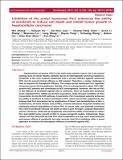| dc.contributor.author | Zheng, Min | en_US |
| dc.contributor.author | Xu, Huijuan | en_US |
| dc.contributor.author | Liao, Xin-Hua | en_US |
| dc.contributor.author | Peng Chen, Champ | en_US |
| dc.contributor.author | Li Zhang, Arina | en_US |
| dc.contributor.author | Lu, Wenxian | en_US |
| dc.contributor.author | Wang, Long | en_US |
| dc.contributor.author | Yang, Dayun | en_US |
| dc.contributor.author | Wang, Jichuang | en_US |
| dc.contributor.author | Liu, Hekun | en_US |
| dc.contributor.author | Zhen Zhou, Xiao | en_US |
| dc.contributor.author | Ping Lu, Kun | en_US |
| dc.date.accessioned | 2017-07-14T14:30:39Z | |
| dc.date.issued | 2017 | en_US |
| dc.identifier.citation | Zheng, M., H. Xu, X. Liao, C. Peng Chen, A. Li Zhang, W. Lu, L. Wang, et al. 2017. “Inhibition of the prolyl isomerase Pin1 enhances the ability of sorafenib to induce cell death and inhibit tumor growth in hepatocellular carcinoma.” Oncotarget 8 (18): 29771-29784. doi:10.18632/oncotarget.15967. http://dx.doi.org/10.18632/oncotarget.15967. | en |
| dc.identifier.issn | | en |
| dc.identifier.uri | http://nrs.harvard.edu/urn-3:HUL.InstRepos:33439348 | |
| dc.description.abstract | Hepatocellular carcinoma (HCC) is the sixth most common cancer, but is the second leading cause of cancer deaths, partially due to its heterogeneity and drug resistance. Sorafenib is the only medical treatment with a proven efficacy against advanced HCC, but its overall clinical efficacy is still modest. Therefore, a major challenge is how to improve its therapeutic efficacy. The unique prolyl isomerase Pin1 regulates numerous cancer-driving pathways. Notably, Pin1 is overexpressed in about 70% HBV-positive HCC patients and contributes to HCC tumorigenesis. However, the role of Pin1 in the efficacy of sorafenib against HCC is unknown. Here we found that sorafenib down-regulated Pin1 mRNA and protein expression, likely through inhibition of Pin1 transcription by the Rb/E2F pathway. Importantly, Pin1 knockdown potently enhanced the ability of sorafenib to induce cell death in HCC, which was further supported by the findings that Pin1 knockdown led to stabilization of Fbxw7 and destabilization of Mcl-1. Furthermore, all-trans retinoic acid (ATRA), a known anticancer drug that inhibits and ultimately induces degradation of active Pin1 in cancer cells, also potently sensitized HCC cells to sorafenib-induced cell death at least in part through a caspase-dependent manner. Moreover, ATRA also synergistically enhanced the ability of sorafenib to reduce Pin1 and inhibit tumor growth of HCC in mouse xenograft models. Collectively, these results not only demonstrate that Pin1 down-regulation is a key event underlying the anti-tumor effects of sorafenib, but also uncover that Pin1 inhibitors offer a novel approach to enhance the therapeutic efficacy of sorafenib against HCC. | en |
| dc.language.iso | en_US | en |
| dc.publisher | Impact Journals LLC | en |
| dc.relation.isversionof | doi:10.18632/oncotarget.15967 | en |
| dc.relation.hasversion | http://www.ncbi.nlm.nih.gov/pmc/articles/PMC5444702/pdf/ | en |
| dash.license | LAA | en_US |
| dc.subject | sorafenib | en |
| dc.subject | Pin1 | en |
| dc.subject | ATRA | en |
| dc.subject | HCC | en |
| dc.subject | cell death | en |
| dc.title | Inhibition of the prolyl isomerase Pin1 enhances the ability of sorafenib to induce cell death and inhibit tumor growth in hepatocellular carcinoma | en |
| dc.type | Journal Article | en_US |
| dc.description.version | Version of Record | en |
| dc.relation.journal | Oncotarget | en |
| dc.date.available | 2017-07-14T14:30:39Z | |
| dc.identifier.doi | 10.18632/oncotarget.15967 | * |
| dash.authorsordered | false | |


